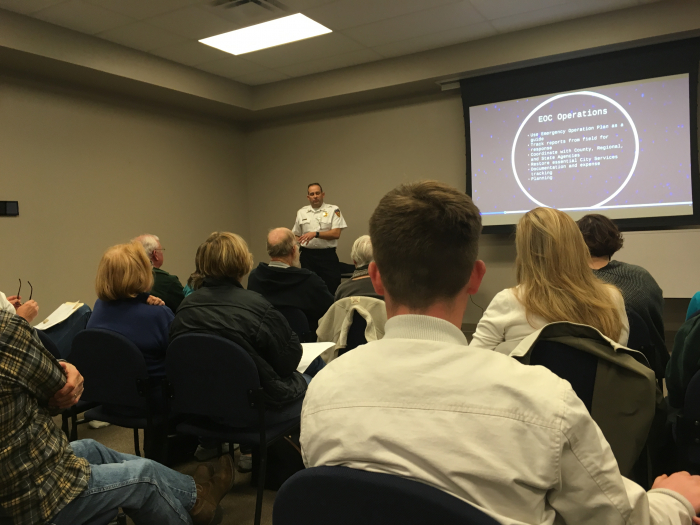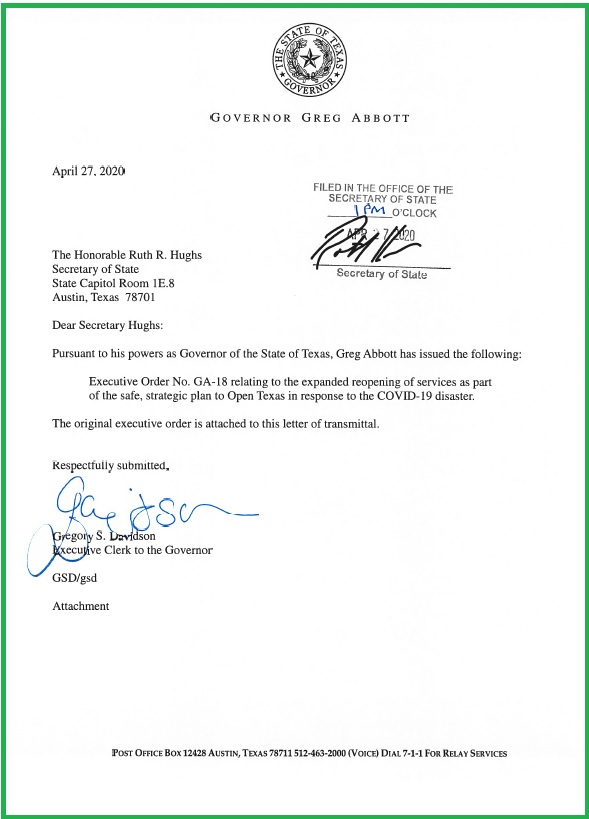Marble Falls Town Hall meeting assesses post-flood response

Connie Swinney/The Highlander
Marble Falls Fire Rescue Chief Russell Sander guided discussion and input from the public during the Town Hall meeting Jan. 29, which addressed response and recovery efforts by the municipality in the wake of the October flood.
By Connie Swinney
Staff Writer
From initial door-to-door response for evacuations to post-flood cleanup provisions for residents, the Town Hall meeting Jan. 29 crafted an assessment of how the community handled the response and recovery process of the October flood event.
Known as an “after-action review,” city officials devised the Town Hall held at the Marble Falls Public Safety Facility (police station and municipal court building) to gather input from citizens to determine what worked well and what could be improved in the aftermath of the flood.
On Oct. 16, flood water from storms in the Junction area produced runoff into the Llano River which eventually slammed into the Highland Lakes which caused temporary evacuations, submerged lakeside homes, deposited debris and caused hundreds of thousands of dollars in damage.
Following the flooding, the city enacted a boil water notice, water use restrictions and a disaster declaration in which the state recognized.
“We had 69 homes that were damaged or destroyed, four businesses and nine government facilities that were affected by the flood,” Marble Falls Fire Chief Russell Sander said at the meeting. “In the rebuilding process, we want to get the residents back in their homes as fast as we can.”
Lakes Marble Falls and LBJ are in the midst of an eight-week drawdown by the Lower Colorado River Authority to assist with repairs, debris removal, dredging and structure maintenance.
“As the lake is lower, we want to make those repairs,” Sander said. “We are monitoring the debris that's coming out of the lake.
“We're providing dumpsters, areas that are hard for dumpsters,” he added. “We've made arrangements and plans to remove debris if there is some that comes from the lake.”
Prior to gathering public input from about 75 attendees, Sander, who was the event incident commander, shared information about the inner workings of the municipality's Emergency Operations Center (EOC) comprised of city officials and emergency personnel and the status of requested disaster funding assistance, including a request for federal emergency disaster declaration.
“The city is seeking avenues for grants for repairs to fix some of our infrastructure,” Sander said.
The status of possible FEMA recovery funding is pending. “There are threshold that have to be met that have not been met,” Sander said.
Discussion with residents included concerns about the emergency alert system and robocalls notifications.
While some residents used warncentraltexas.org alerts, others relied on those from the Lower Colorado River Authority and questioned the efficiency and timing of the systems.
“On the regional notification system, that's something we identified and we're investigating.
Sander said.
Overall input about what was most effective in response and recovery included:
• Volunteer response from residents and non-residents;
• Response and performance of city staff;
• Direct, door-to-door delivery of rebuilding information;
• Waving of repair permit fees;
• Providing dumpsters for debris removal during initial response;
• Drawdown lake debris removal dumpsters provisions; and
• Maintaining wastewater service despite facility damage.
Marble Falls resident Mark McCrary suggested the city determine ways to improve resident notification
“We want to better assess for our own purposes what actually went on between the LCRA alert system,” McCrary said.
He also applauded improvements in city response compared to a past flood event.
“Living through the 2007 flood, we had no utilities. That means you can't do laundry, no drinking (water), you can't do anything without that clean water,” McCrary said. “The fact that you all, as a city, were able to get that up and running within 24 hours, just about right after the water receded.
“In 2007, we left town for a week while Red Cross brought whatever in and houses languished,” he added. “In this particular situation, you wouldn't have recovered those minor home damages as quickly, if that occurred.”
Mayor John Packer said much of the push for initial response involved public safety.
“If we would have waited to get those dumpsters out there, we would have had a major health hazard. We just had to take it out of reserves,” Packer said.
One resident detailed an experience with city personnel interaction and post flood criminal activity or looting, which cast a critical eye on law enforcement.
Police Chief Mark Whitacre responded with concerns about communication.
“I heard some say, 'We were robbed.' Did you file a report?” Whitacre said. “I would ask for those of y'all who had things that were taken or stolen to please call the police department, and let's get a report, so we have an accurate accounting of what's missing and taken because we had very little looting report to us.”
Overall discussion about what could improve response and recovery included:
• Establishing a centralized phone number during a disaster;
• Training volunteers to help during the onset of the flood;
• Researching the potential for debris removal by outside entities such as LCRA;
• Designating staging areas for placing, moving or collecting debris and damaged items; and
• Utilizing city heavy equipment (for example, a skid loader) to help in the aftermath of a disaster.
Some attendees applauded volunteers and city staff but recommended more site planning in post-flood cleanup efforts.
Gary Simmank, a community volunteer, said Pecan Valley residents designated their POA park as a staging area for debris, equipment and other resources.
“The (Pecan Valley POA) park was torn up, but we're already putting it back together,” said Simmank, who also offered kudos to city staff for their assistance.
“I work for the city of Austin,” he said. “The city inspectors were spot on.
An area of concern among attendees included issues with remaining lake debris and damage.
Vance Fields, who has lived on Lake Marble Falls for 20 years, recommended the city take a bigger role in waterway cleanup management.
“I've been fighting LCRA for 40 years. They won't listen to me,” said Fields, who lives within the Marble Falls ETJ (extra-territorial jurisdiction). “They're not going to do anything to clean up the lake.
He and family members have spent time removing debris and damaged structures from the lake bed as the drawdown gets ready to come to a close Feb. 23.
“I've been through a lot of floods. If we, as a city, if we don't address this lake, we're going to have a problem, five or 10 years down the road,” he said. “There's stuff in the lake that's going to kill people or create some serious damage.
“If people start getting killed on it, hurt on it, boat wreck on, because of debris that's not removed from these lakes, people are going to quit coming,” he added.
He suggested an LCRA town hall meeting with several communities in attendance.
“We're going to have to come up with a consensus of doing something with Lake Marble Falls. There's deadly stuff out there right now,” Fields said. “If we don't address these issues, Lake Marble Falls is going to turn into a deadly lake. It's one of the biggest resources in the Highland Lakes.
He said a lack of cleanup effort on the part of area communities could also eventually reduce property values as well as pose a navigation threat.
“It's going to lower property values. It's going to turn tourism on its ear,” he said. “We're spending millions of dollars on a convention center and all the improvements down at the park.
“This lake is the biggest draw we have in the entire community, and we're not addressing the issue. We're not talking about who's going to clean these lakes up. Who's going to do it?”
From the standpoint of the city, Packer agreed.
“We do all this to fix our infrastructure back up, our water intake. Somebody's debris comes down the lake and knocks it out,” Packer said. “We'll do our best to see if we can get LCRA to do a town hall meeting. We need one for Lake Marble Falls.”
Packer also commended the city staff for their post flood event efforts.
“I can't commend our staff enough. We've done exercises. We did practice exercises,” he said. “We're one of the best managed medium-sized cities.
“We have a good system. That's why we're here tonight,” he added. “A good system has a way of improving that system. We have a lot of stuff to work on.”
Send Connie Swinney a note at connie@highlandernews.com.






